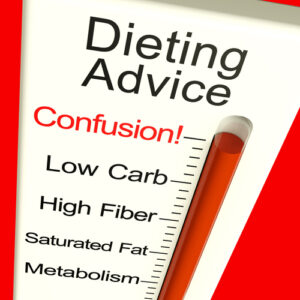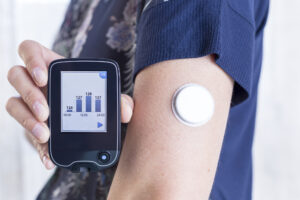What Does This Study Mean For You?
Author: Dr. Stephen Chaney
 Personalized diets are highly advertised. We are told to forget the old “one size fits all” diets of the past. We are told we are all different, so diets should be individualized to us.
Personalized diets are highly advertised. We are told to forget the old “one size fits all” diets of the past. We are told we are all different, so diets should be individualized to us.
We are promised that by collecting DNA samples from our tissue or bacteria in our gut, blood samples, and personal medical history, a personalized diet can be created that “fits us like a glove”.
But are those promises true, or are they hype? Diets to control blood sugar spikes should be a perfect topic for testing those claims. Millions of Americans have trouble controlling their blood sugar levels. Specifically:
- 1 million adults (14.7% of US adults) have diabetes, mostly type 2 diabetes.
- 6 million adults (38.0% of US adults) have prediabetes.
-
- That amounts to 52% of the US population who have trouble controlling blood sugar levels.
- Previous studies have shown that prediabetes and type 2 diabetes are largely reversible with diet and lifestyle change.
- Recent studies have shown tremendous inter-person variability in the blood sugar response to any given food.
- Previous studies have shown that our gut bacteria influence our blood sugar response to foods.
In theory, blood sugar control should be the perfect candidate for personalized diets. With that in mind, the authors of this study have created an algorithm called PNP (Personal Nutrition Program) that combines continuous blood glucose monitoring, HbA1c measurement (a measure of blood sugar control), personal characteristics (physical activities, sleep times, stress, and hunger), and a DNA analysis of stool samples to identify the species of gut bacteria. They also created a PNP app to allow participants to monitor and modify the foods they ate on a continuous basis.
In this study (AY Kharmats et al, The American Journal of Clinical Nutrition, 118: 443-451, 2023) the authors compared the effectiveness of their Personalized Nutrition Program algorithm with a standard, one-size-fits-all, low fat diet for improving blood sugar control in patients with prediabetes and type 2 diabetes.
Note: They used a low fat diet because, despite what you may have heard, low fat diets are better than low carb diets for diabetics. Of course, the low fat diet they used was created by dietitians. The carbohydrates came from whole foods rather than added sugars.
How Was The Study Done?
 The investigators recruited 156 participants from the NYU Langone Health Center between January 2018 and March 2021. The participants selected were overweight with prediabetes or moderately controlled type 2 diabetes. For participants with type 2 diabetes, it was managed with lifestyle alone or lifestyle plus metformin. Other characteristic of the study participants were:
The investigators recruited 156 participants from the NYU Langone Health Center between January 2018 and March 2021. The participants selected were overweight with prediabetes or moderately controlled type 2 diabetes. For participants with type 2 diabetes, it was managed with lifestyle alone or lifestyle plus metformin. Other characteristic of the study participants were:
- Gender: 33.5% male, 66.5% female.
- Race & Ethnicity: 55.7% white, 24.1% black, 16.5% Hispanic.
- Education: 69.5% with a college degree.
- Baseline BMI: 33 (Obese).
- Baseline HbA1c: 5.8% (prediabetic range) with 12% of participants ≥6.5% (diabetic range).
The participants were randomly divided into two groups that were matched with respect to weight and blood sugar control. One group was put on a diet based on the investigator’s PNP algorithm. The other group was put on a standardized low fat (< 25% of calories from fat) diet that is often used with diabetic patients.
Upon admission to the study, blood samples were drawn for HbA1c, a detailed questionnaire was filled out, and stool samples were obtained for DNA analysis to identify the species of bacteria in their gut.
Each participant was given a continuous glucose monitoring device to wear during the study. This allowed the investigators to monitor the participants blood sugar control throughout the study.
All this information was used to provide individual diet recommendations for the personalized diet group using the PNP algorithm developed by the investigators.
The study lasted 6 months and measured improvements in blood sugar control as assessed by a decrease in blood sugar spikes and a reduction in HbA1c.
Both Groups were put on a registered dietitian-led behavioral intervention program targeting 7% weight loss and a calorie deficit goal of 500 calories per day. The 1-hour sessions were conducted by Webex weekly for 4 weeks and then every other week for the remaining 5 months. The sessions included:
- Education (e.g., obesity risks, benefits of weight loss, strategies for restricting calories, protocols for aerobic exercise and strength training, and dealing with weight loss plateaus)
- Behavioral change (e.g., importance of behavioral change, goal setting, self-reward, and problem-solving around common barriers to weight loss success)
The participants were advised to gradually build up to 150 min/week of moderate intensity exercise.
Each participant was given access to the PNP mobile app designed by the investigators. The app provided real-time feedback regarding their dietary intake relative to the target specific to their group (low fat diet or personalized diet). Participants were asked to use the app to:
- Enter their dietary intake and self-monitor their meals (If the meal did not match the target specific to their group, the participants were trained how to substitute other foods, so their meal better matched their target.)
- For the Standardized Low Fat Group, the PNP app provided real-time feedback regarding calorie intake and macronutrient distribution for meals and snacks logged in by the participants.
- For the Personalized Group the PNP app scored meals as excellent, very good, good, bad, or very bad based on the PNP algorithm developed by the investigators.
Can Personalized Diets Help Control Blood Sugar?
- Weight loss was identical on both diets. This is no surprise. The study design included an exceptionally well-designed weight loss protocol for both groups.
- The decrease in HbA1c was identical on both diets.
- The improvement in blood sugar control was identical on both diets.
The investigators concluded, “[The] personalized diet did not result in an increased reduction in GV [blood sugar control] or HbA1c in patients with prediabetes or moderately controlled type 2 diabetes compared to a standardized diet.”
Since the investigators had designed the algorithm used to create personalized diets for this study, this was probably not the result they wanted.
So, they added, “Additional subgroup analyses may help to identify patients who are more likely to benefit from this personalized intervention.”
What Does This Study Mean For You?
 This first takeaway from this study was obvious:
This first takeaway from this study was obvious:
- The personally designed diet did not perform any better than a standard, one size fits all, diet at improving blood sugar control.
Of course, this was not any standard diet. It was a diet that has been used successfully with diabetics for years. However, a lot of research had gone into developing the personalized diet. One might have expected it to perform better.
This is not the first study in which a personalized diet has performed no better than a standard diet. It doesn’t mean that the concept behind personalized diets is faulty. It just means we don’t yet know enough to design a personalized diet that really works.
The second takeaway from this study might be less obvious:
- Weight loss is the most important factor for improving blood sugar control. Any diet that reduces weight will improve blood sugar control. This is also true for many other health issues such as high cholesterol, high blood pressure, high triglycerides, and osteoarthritis.
- However, this should not come as a surprise either.
-
- Vegan and keto diets are polar opposites. Yet both give similar short-term weight loss and provide similar short-term health benefits.
-
- Studies have shown that intermittent fasting gives no better weight loss and health benefits than any diet that cuts calories to a similar extent.
-
- In other words, the diet you choose or the way you choose to restrict calories doesn’t matter. It is weight loss that provides the health benefits.
- However, diet does appear to matter in the long term. If you look at studies ranging from 10 to 30 years, primarily plant-based diets provide better health benefits than primarily meat-based diets. And diets consisting primarily of whole, unprocessed foods provide better health benefits than diets high in processed foods.
Finally, there is an important corollary to this study showing that a personalized diet performed no better than a standardized diet at controlling blood sugar.
- Some companies are trying to sell you expensive personalized diets with extravagant claims about the health benefits of their diet. Be wary of those diets. The science supporting their diets is premature. Their claims may be misleading.
- And if the companies claim their diet is supported by published clinical studies, you should evaluate those studies carefully. The study I reviewed in this article was an exceptionally well-designed study. Any study that does not control for weight loss is likely to provide misleading results.
The Bottom Line
A recent study compared the effectiveness of a personalized diet and a standardized diet in improving blood sugar control for patients with prediabetes or type 2 diabetes. The results were clear-cut:
- Weight loss was identical on both diets. This is no surprise. The study design included an exceptionally well-designed weight loss protocol for both groups.
- The decrease in HbA1c was identical on both diets.
- The improvement in blood sugar control was identical on both diets.
This doesn’t mean that the concept behind personalized diets is faulty. It just means we don’t yet know enough to design a personalized diet that really works.
For more information on this study and what it means for you, read the article above.
These statements have not been evaluated by the Food and Drug Administration. This information is not intended to diagnose, treat, cure or prevent any disease.
______________________________________________________________________________
My posts and “Health Tips From the Professor” articles carefully avoid claims about any brand of supplement or manufacturer of supplements. However, I am often asked by representatives of supplement companies if they can share them with their customers.
My answer is, “Yes, as long as you share only the article without any additions or alterations. In particular, you should avoid adding any mention of your company or your company’s products. If you were to do that, you could be making what the FTC and FDA consider a “misleading health claim” that could result in legal action against you and the company you represent.
For more detail about FTC regulations for health claims, see this link.
https://www.ftc.gov/business-guidance/resources/health-products-compliance-guidance
_____________________________________________________________________
About The Author
Dr. Chaney has a BS in Chemistry from Duke University and a PhD in Biochemistry from UCLA. He is Professor Emeritus from the University of North Carolina where he taught biochemistry and nutrition to medical and dental students for 40 years. Dr. Chaney won numerous teaching awards at UNC, including the Academy of Educators “Excellence in Teaching Lifetime Achievement Award”.
Dr Chaney also ran an active cancer research program at UNC and published over 100 scientific articles and reviews in peer-reviewed scientific journals. In addition, he authored two chapters on nutrition in one of the leading biochemistry text books for medical students.
Since retiring from the University of North Carolina, he has been writing a weekly health blog called “Health Tips From the Professor”. He has also written two best-selling books, “Slaying the Food Myths” and “Slaying the Supplement Myths”. And most recently he has created an online lifestyle change course, “Create Your Personal Health Zone”. For more information visit https://chaneyhealth.com.
For the past 45 years Dr. Chaney and his wife Suzanne have been helping people improve their health holistically through a combination of good diet, exercise, weight control and appropriate supplementation.













